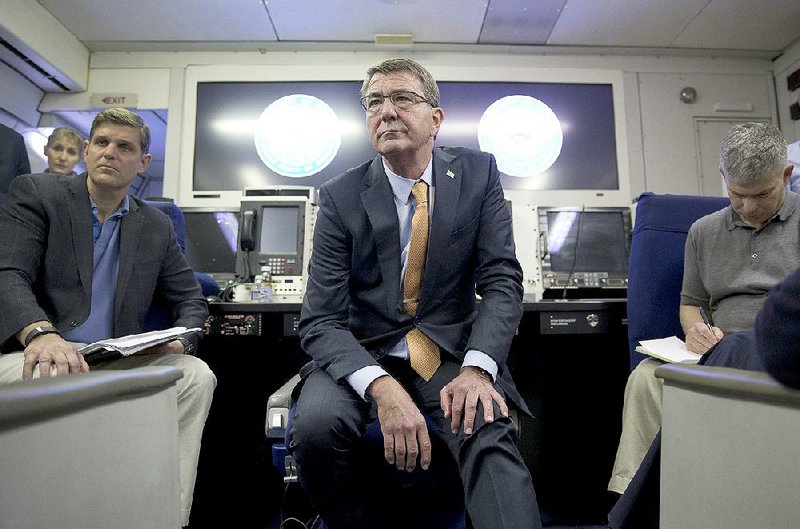WASHINGTON -- U.S. Defense Secretary Ashton Carter arrived in Israel on Sunday on a mission to reassure allies and Arab partners about American resolve after agreeing to a nuclear deal with Iran.
Carter said his trip to Israel, Saudi Arabia and Jordan "comes at a very important moment because of the Iran deal," which Israeli Prime Minister Benjamin Netanyahu has condemned as a threat to Israel.
Carter is scheduled to meet with Israeli Defense Minister Moshe Yaalon today and with Netanyahu on Tuesday before traveling to Saudi Arabia and Jordan.
The Pentagon chief said he will use the visit to discuss ways to improve military cooperation without trying to persuade Israeli leaders to support the deal, which barters an easing of economic sanctions on Iran for curbs on the Islamic Republic's nuclear program.
"I'm not going to change anybody's mind in Israel," Carter told reporters aboard his plane en route to Tel Aviv. "Friends can disagree. We can agree to disagree about the deal."
While a U.S. defense official said no new weapons deals for Israel or Arab allies are planned during the trip, Carter said he will discuss ways to bolster Israel's ballistic missile defense and counterterrorism capabilities, while protecting the country's "qualitative military edge" in the region.
In the interview, Carter previewed the message he will convey to Israel, Jordan and Saudi Arabia on behalf of President Barack Obama, who already has called a number of Mideast leaders to reaffirm U.S. support and to explain the Iran deal.
Carter said the agreement made with Iran by the U.S. and five other world powers last week is "a good deal" that "removes a critical element of danger, threat and uncertainty from the region."
The deal "places no limitations on the United States or the Department of Defense" to carry out its strategy in the region, which includes countering the "malign influence" of Iran, he said. The U.S. retains all military options, he added.
Netanyahu, in an interview Sunday on ABC's This Week with George Stephanopoulos, reiterated his opposition to the deal, saying it will pave the way for Iran to develop nuclear weapons and give Tehran billions of dollars to spend on a "war machine."
"Everybody talks about compensating Israel," Netanyahu said. "I guess the question you have to ask yourself is, if this deal is supposed to make Israel and our Arab neighbors safer, why should we be compensated with anything?"
Persian Gulf allies, led by Saudi Arabia, have questioned whether Iran can be trusted to honor the accord and how it may use its newfound clout and billions of dollars in revenue in a region ripped apart by sectarian conflicts.
Carter said he plans to meet with King Salman of Saudi Arabia to discuss ways to counter Iranian aggression and combat Islamic State forces.
When asked if he has plans to increase U.S. presence in the Persian Gulf region, Carter said, "We're always looking for ways to strengthen our posture."
For Saudi Arabia, the U.S. will work to improve counterterrorism activities, maritime security, special operations, integrated air and missile defenses, and cybersecurity, he said.
Calling Israel "a critical friend, a critical ally," Carter said he plans to travel with Yaalon to the country's northern border with Jordan and Syria. The visit will help Carter assess the threat posed by Iran-backed Hezbollah, which the U.S. considers a terrorist organization.
When asked if he was concerned that Israel could take pre-emptive military action against Iran because of the nuclear deal, Carter said only that military options have been discussed with Israeli officials and that the U.S. military option is preserved.
The U.S. has invested hundreds of millions in an Israeli air defense system known as Iron Dome, designed to shoot down short-range rockets, and mortar and artillery shells fired into northern Israel from southern Lebanon and into Israel's south from the Gaza Strip.
Two months ago, Washington announced a $1.9 billion arms sale to Israel for a range of missiles and bombs, including bunker busters that can penetrate reinforced defenses to reach underground targets.
The trip also includes a stop in Jordan that will focus on the U.S.-led coalition campaign to defeat the Islamic State, which declared a self-styled caliphate, or state under Islamic law, in parts of Iraq and Syria.
The visit will include a meeting with the squadron of a Jordanian pilot who was burned alive by Islamic State extremists, said the U.S. defense official, who briefed reporters Friday on condition of anonymity to discuss unannounced plans.
Information for this article was contributed by David Lerman and Silla Brush of Bloomberg News and by Robert Burns and Josef Federman of The Associated Press.
A Section on 07/20/2015
